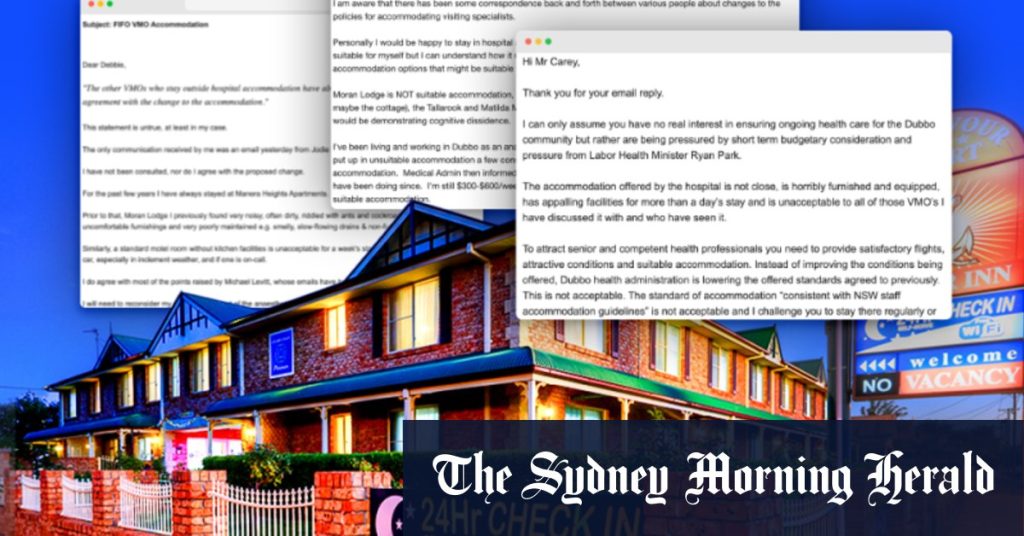Fly-in-fly-out anaesthetists who work at Dubbo Base Hospital are threatening to boycott the hospital due to a recent cut to their accommodation budget. The Western NSW Local Health District informed visiting medical officers last week that the hospital would only provide housing in specific apartments, units, and a motel owned by the hospital, eliminating the option for doctors to choose their own accommodation. This decision has raised concerns among doctors who find the provided accommodation at Endeavour Court Dubbo to be inadequate for their needs, citing issues such as cleanliness, discomfort, and lack of amenities.
In response to the complaints, chief executive Debbie Bickerton stated that the provided accommodation meets the necessary standards and that most VMOs are content with the changes. However, doctors argue that the accommodation lacks certain comforts and necessities, such as coffee making facilities, appropriate toiletries, and adequate cooking facilities. They believe that their time away from family should be compensated with comfortable and well-equipped housing, emphasizing the importance of having a proper living space during their stays at the hospital.
The threat of a boycott from anaesthetists could potentially disrupt surgeries and services at Dubbo Base Hospital, which heavily relies on a temporary workforce to support its operations. VMOs play a crucial role in providing medical services at regional hospitals like Dubbo, where the availability of specialized healthcare professionals is limited. The hospital administration will need to address the concerns raised by doctors in order to maintain a functional and efficient healthcare system for the local community.
Some doctors expressed their discontent with the distance between the hospital and the provided accommodation, as well as the condition of the furnishings and amenities in the units. One anaesthetist described the hospital accommodation as dirty, infested with pests, and poorly maintained, indicating that they may reconsider their work at the hospital if the changes are enforced. The quality of housing for temporary medical staff is essential for ensuring their well-being and productivity while away from their homes, and the hospital should strive to provide a suitable environment for these healthcare professionals.
VMOs are private medical specialists who work on a contractual basis with hospitals, providing their services as needed. They have flexible working hours and can earn a significant hourly rate for their expertise, making them valuable assets to regional hospitals with limited permanent staff. The potential boycott by anaesthetists at Dubbo Base Hospital highlights the importance of proper accommodation and support for visiting medical officers, as their satisfaction and well-being directly impact the hospital’s ability to deliver quality healthcare services to the community.
In conclusion, the dispute over accommodation for fly-in-fly-out anaesthetists at Dubbo Base Hospital underscores the challenges faced by regional hospitals in maintaining a temporary workforce. The hospital administration must address the concerns of visiting medical officers to ensure the continued provision of essential medical services to the local community. Balancing the needs and expectations of VMOs with the hospital’s budget constraints will be crucial in resolving the conflict and preventing potential disruptions to surgeries and healthcare services in the region. Adequate support and accommodation for temporary medical staff are essential for maintaining a functional and efficient healthcare system in regional areas like Dubbo.


